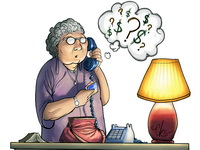Lottery Scam Alert: Beware of Jackpot Announcements Lurking in Your Mailbox

Meet Shaw Financial Lottery Scam!
Writing about lottery scams regularly, we were pretty sure that we’d seen it all. Boy, were we mistaken! It seems that scammers come up with endless ways in which they empty the pockets of vigorous enthusiasts that want to get rich quickly.
The Shaw Financial Lottery Scam is just one more of the basic schemes that (surprisingly!) seem to deliver results. Here’s how it works and what you should do to make sure that you’re on the safe side.
Congratulations, You’re the (Not So) Lucky Winner!
This is an international scam dating back to 2012. And though the information has appeared about it in RipoffReport.com, gullible individuals still exist, and they always fall for this rather basic scam.
It involves a letter being sent from Shaw Financial Inc. – apparently a South African company that sends letters without including a return address on the envelope. But let us assume that this isn’t suspicious enough and move on to the content of the letter.
The letter itself claims that the recipient is the winner of a 300,000 dollar sweepstake prize. What makes this scam different from other dull mail lottery schemes is that the letter also includes… wait for it… a check. Some of the people that have gotten this letter find a check for 3,950 dollars inside and the check was supposedly deducted from the entire prize amount.
According to the letter instructions, the check is included to deal with processing fees. These add up to 3,650 dollars.
The check is bad, and the individual eager to win 300,000 dollars will have to pay the so-called processing fee out of their pocket. People from all parts of the US have gotten such letters. The letters supposedly contain contact information for Shaw Financial Inc., but nobody answers the supplied phones.
What’s quite interesting is that the check itself looks rather authentic. Even individuals that worked at a bank found it incredibly difficult to say whether it was a genuine financial instrument or a replica. Some people did carry out a bit of research to determine authenticity, but others fell for the scam headfirst.
One More Nasty Little Trick
The creators of the Shaw Financial Lottery Scam have one more nasty little trick up their sleeve.
Several of the individuals that got the letter managed to call and reach the supposed “agent” representing Shaw Financial. The person instructed them to keep the winning confidential, to avoid all of the hassle and the media attention stemming from the big win.
The agent even told the supposed winners that they should keep the information at the bank confidential when trying to cash the fraudulent check.
There’s a straightforward explanation for this request, and it has nothing to do with the safety of the prize winners. Scammers know that bank professionals will be capable of identifying the letter and the check as a scam. This is the main reason why they advise victims to keep the information confidential.
One of the people that attempted to cash the check didn’t follow the instructions and shared the letter with the bank employee. Quickly, professionals working at the bank identified the letter as a scam and prevented the person from committing a grave mistake.
A Few Basic but Efficient Tips that will Keep You Safe
We’ll never get tired of repeating the same thing because it can save so many people from losing money on ridiculous lottery scam like the Shaw Financial letter.
First, remember that you can’t win a lottery that you haven’t bought a ticket for. The same applies to sweepstakes and raffles that you haven’t consciously entered. Nobody can submit your name for these competitions on your behalf.
Second, you should never respond to prize claims received by letter or email. These usually feature a deadline by which the prize money can be collected. This deadline is there for a reason – it sends people in panic mode and makes them do stupid things.
Don’t call numbers or send emails. Don’t give the scammers any personal information. Even if the data isn’t financial, it can be used against you. A legitimate lottery will never ask for such information, especially when it comes to your bank account or credit card number.
Always research companies that claim to be the organizers of lotteries and sweepstakes. You have the internet at your disposal, and it’s sufficient to verify whether a business does exist or if it’s a made-up entity to scam people. A bit of online research and a phone call or two will quickly reveal the truth.
If you believe that you’re the victim of a lottery scam, call the Attorney General’s Consumer Protection Division or any other institution responsible for consumer protection immediately. You’ll be provided with more information about the fraud (especially if it’s a recognized scheme) and you’ll also get recommendations about protecting yourself from the scammers.
You May Like: